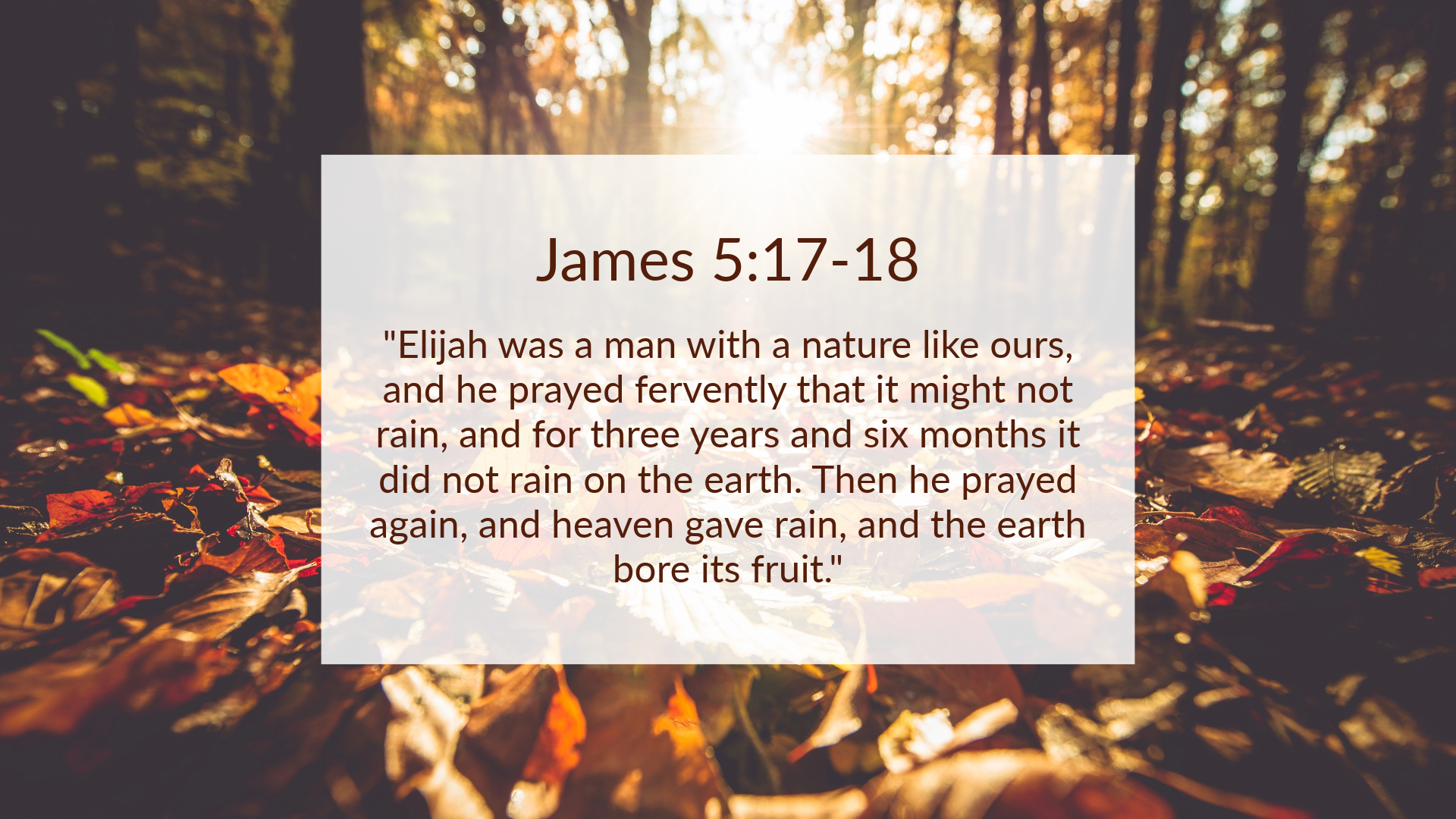We've reached the last month studying through the letter of James. This section is a good wrap up to the rest of the study. While James mainly talks about prayer in these last verses, he also restates some of the key themes of the letter, such as going through trials and the misuse of the tongue. Through the whole letter, a reoccurring point has been that Christians should not just profess faith in God but should live lives that reflect the reality of their profession. It's not enough to just say that you're a follower of Christ; your actions must reflect that! Part of being a follower is praying, which James goes into detail about at the end of his letter.
"Is anyone among you suffering?... Is anyone cheerful?... Is anyone among you sick?"
Three different circumstances are listed, and you know what the response to all of these situations are? Prayer (or praise to God). In all circumstances, James says we should be going to God. While this might seem obvious as Christians, oftentimes, people will go to other people to seek comfort, to celebrate, etc. However, God is supposed to be the center of our life!
These verses get a bit more complicated because there are a few ways of interpreting what James is saying. Is he talking about the physically sick or the spiritually sick? It seems like you can interpret it both ways. I want us to take some time to look at other passages that mention sickness, sin, and prayer.
"As he passed by, he saw a man blind from birth. And his disciples asked him, 'Rabbi, who sinned, this man or his parents, that he was born blind? Jesus answered, 'It was not that this man sinned, or his parents, but that the works of God might be displayed in him." - John 9:1-3
"For anyone who eats and drinks without discerning the body eats and drinks judgment on himself. That is why many of you are weak and ill, and some have died." - 1 Corinthians 11:29-30
Throughout the Gospels, we see Jesus healing people both physically and spiritually. This same double connotation seems to be seen in these verses as well. At the end of verse 15, it says, "if he has committed sins…" This verse implies that James doesn't think all sickness is connected to specific sins.
It isn't something commonly talked about today with people linking sicknesses/sufferings to a person or their parents' sinning; however, in ancient times, this was a common belief. The verses above from John shows that Jesus said a person isn't born blind or goes through sufferings just because of sin – the same can be seen in our passage in James. I believe the main emphasis here is the importance of prayer. James wants believers to know there is real power in prayer! Do you also believe in the power of prayer and the ability for healing to come?

This next section specifically talks about Elijah and how he fervently prayed and his prayers were answered. James says that we're no different than Elijah. Oftentimes, we forget that we're the same as them and praying to the same God as people in the Bible like King David, Moses, etc. We shouldn't be placing these people in the Bible up on a pedestal, thinking the things they did were unattainable – James is saying we're no different, we're all imperfect people! A similar thing tends to happen with pastors/ministers. It can be easy to place them on a pedestal when in reality, they're still just humans that struggle with different sins, just like we do.
In these two verses, Elijah had a strong faith in God and believed in the power of prayer. Do you have this type of faith? Do you think God can respond to your prayers like He did with Elijah? Do you believe you can have intimacy with God like we saw David did in the Bible? This is an important reminder that we pray to the same God that we read about in the Bible, the same God that miraculously healed people and answered their prayers.
James concludes his letter by mentioning that God could be using you to turn others back to Him… how cool is that? God can use you to change someone's eternal destiny. It's incredible to think about the fact that God uses ordinary people to have an impact on someone's eternity.
As we finish this study, what is something you're going to work on doing to improve actually LIVING out your faith instead of just talking about your faith?
Cornerstone Impact Update
Investing was the last topic in our Biblical Approach to Finances series. It was split up into two different blogs. The first focused on our attitude and what the Bible says about investing. If you missed this blog from July, you can check it out here:

Eventide
One of our BRI partners, Eventide, further defines what is better and more valuable by examining the roles of businesses as extensions and tools for us. As they look at what businesses are doing, they ask, are they helping us develop, sustain, and restore creation?
Read more about this in a short article by Eventide’s Director of Education, Shaun:

New Cornerstone Shirts!

Our last shirt design was so popular that we ordered the design in a different color! We now have more shirts available (for FREE)! Remember, there are limited quantities for each size, so order soon to ensure we have your shirt size.






